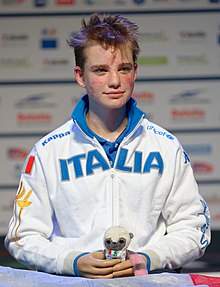Wiki Loves Sport/bn
Wiki Loves Sport is the first multi-language and cross-wiki campaign that encourage the participation and promotes creation of contents about (but not exclusively) women, non-binary and para-athletes in Wikimedia projects. Project page in Italian Wikipedia.
1900s



Although since the 1970s and 1980s, women have begun to carve out an important role in the sports disciplines (previously practiced exclusively by men) and despite a continuous path of female emancipation in sport, stereotypes still exist about women in sport who see them as too weak, too emotional and not very competitive.
In the twentieth century, things changed: some women managed to participate unofficially in tennis, golf, croquet and sailing competitions at the 1900 Summer Olympics in Paris, while in 1921 the first Women's Olympiad was held in Monte Carlo.
In 1928, at the Amsterdam Olympics, women were admitted to athletics competitions. In 1936, women's competitions were established in Berlin in the main sports categories. But only the 2012 London Olympics accepted the participation of female athletes in all disciplines, including women's boxing.
2000s
At the 2004 Summer Olympics in Athens, for the first time, women competed in wrestling - in the freestyle weight classes of 48 kg, 55 kg, 63 kg and 72 kg, in the saber discipline and Afghan women competed in the Olympics for the first time after the nation was banned from Sydney 2000 by the IOC due to the Taliban government's opposition to women in sport.
At the 2006 Turin Winter Olympics the program remained unchanged and at the 2008 Summer Olympics in Beijing, some new events for women were added, such as the 3,000m obstacle course and the 10km marathon. Baseball and boxing remained the only sports not open to women at these Games.
At the 2010 Winter Olympics in Vancouver, skicross debuted for both women and men. The 2012 Summer Olympics saw the debut of women's boxing, which coupled with the IOC's decision to eliminate baseball from the program for this edition, resulted in women competing in all sports at the Summer Games for the first time. London 2012 also marked another record: it was the first time that all national Olympic committees have sent a female athlete to the Games (among them Brunei, Saudi Arabia and Qatar did it for the first time).
The women's ski jump made its first appearance at the 2014 Winter Olympics in Sochi. At the 2016 Summer Olympics in Rio de Janeiro the first women's seven-a-side rugby competition and golf for women was added back to the program, for the first time since 1900. The 2018 Winter Olympics in Pyeong Chang saw the addition of big air snowboard, mixed double curling, mass start speed skating and mixed team alpine skiing.
The women will compete in softball, karate, sport climbing, surfing and skateboarding at the 2020 Summer Olympics in Tokyo. The International Ski Federation said it aims to include the women's Nordic combined in the Olympic program at the 2022 Winter Olympics in Beijing for the first time. The new sport climbing event will have several categories: speed climbing, bouldering and lead climbing. The 2020 Olympics are the first time that women will compete in these sports.
The 2020 Olympics will also be the first year that openly trans women will be able to compete in the Olympics with Laurel Hubbard competing in weightlifting.
- Gallery

According to Humaniki tool (powered by Wikidata), except for Spanish Wikipedia and Wikimedia Commons, in the top 10, the percentage of biographies of women or non-binary people does not exceed 20% of the total biographies of humans that have content in at least one Wikimedia Project.
- Arabic Wikipedia: 79.952 women and 250 non binary on 493.101 biographies (16.214% and 0.051%);
- Egyptian Arabic Wikipedia: 110.604 women and 377 non binary on 720.473 biographies (15.352% and 0.052%);
- English Wikipedia: 346.438 women and 1.444 non binary on 1.825.541 biographies (18.977% and 0.079%);
- French Wikipedia: 119.349 women and 612 non binary on 633.524 biographies (18.839% and 0.097%);
- German Wikipedia: 136.598 women and 415 non binary on 824.441 biographies (16.569% and 0.050%);
- Italian Wikipedia: 68.443 women and 274 non binary on 428.484 biographies (15.973% and 0.064%);
- Polish Wikipedia: 63.285 women and 152 non binary on 380.151 biographies (16.647% and 0.040%);
- Russian Wikipedia: 74.115 women and 390 non binary on 478.191 biographies (15.499% and 0.082%);
- Spanish Wikipedia: 94.441 women and 545 non binary on 428.779 biographies (22.026% and 0.127%);
- Wikimedia Commons: 132.084 women and 573 non binary on 647.297 biographies (20.405% and 0.089%);
See the list on the left, license Creative Commons Attribution-ShareAlike 3.0 International.
History
Wiki Loves Sport (as Wiki Loves Fashion), is a campaign ideated and planned to be organized in 2018, included in WikiDonne Roadmap – project request to cover one year of activity WikiDonne User Group – which was selected to be granted. Since the grant was turned back in March 2018, the campaign was effectively organized for the first time in 2019.
২০২২-এর সংস্করণ
The edit-a-thon covers various sporting events scheduled between TBD and TBD: 2022 Women's FIH Hockey World Cup, 2022 World Athletics Championships (men and women), 2022 Trampoline Gymnastics World Championships, 2022 Commonwealth Games (men and women), UEFA Women's Euro 2022 and much more.
2021 edition
The event takes place during the 2020 Summer Olympics (Giochi della XXXII Olimpiade) in Japan known as Tokyo 2020, from 23 July to 8 August 2020, the 2020 Summer Paralympics (XVI Giochi paralimpici estivi, from 24 August to 5 September) and the 2021 Women's European Volleyball Championship (Campionato europeo di pallavolo femminile 2021, from 18 August to September 4, 2021).
2020 edition
The event was initially scheduled to cover 2021 Rugby World Cup (Coppa del Mondo di rugby femminile 2021). Due to COVID-19, the female rugby world cup was postponed (from 8 October 2022 to 12 November 2022), so the 2020's edition of Wiki Loves Sport was organized during the Summer Olympics (24 July – 9 August) and Summer Paralympics (25 August – 6 September) in Tokyo (these physical events have been postponed themselves in 2021). Page in Italian.
2019 edition
The event was organized during the FIFA Women's World Cup in France. Page in Italian.
Wiki Loves Sport is a campaign launched by WikiDonne User Group during WikiDonne roadmap to write about diversity in sport. Are you interested in getting involved with Wiki Loves Sport? Want to talk about any other kind of diversity in sport content collaboration?
WikiDonne UG User Group for bridging the gender gap
Add your affiliate name and logo below






